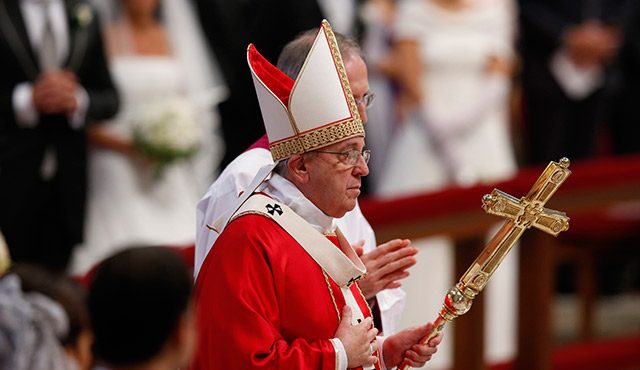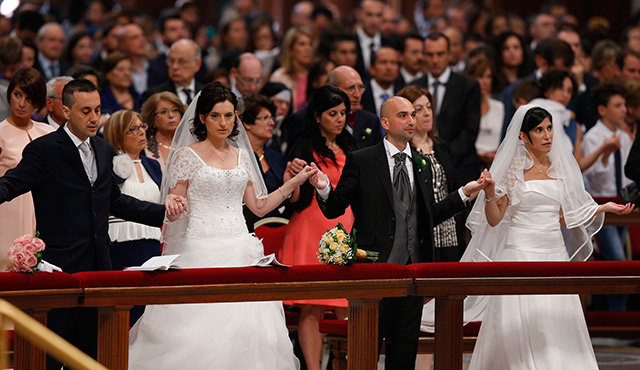The seven sacraments – divine symbols that reveal Jesus – are of course a cornerstone of Catholicism. How, then, can any Catholic live as if the sacrament of matrimony were no longer relevant? Further still, is marriage itself becoming less relevant?
According to the Pew Research Center, in 2014 only half of all Americans were married compared to 72 percent in 1960. Another study by the same group showed that nearly four in 10 Americans think marriage is becoming obsolete. And a third study by Pew found that only 29 percent of millennials see marriage as a high priority.
At least practicing Catholics hold this sacrament as preeminent, right? The divorce statistics alone are irrefutable.
Not so fast. Different studies by a variety of organizations report that the divorce rate among Catholic couples is significantly lower than average; and that a couple’s religion has no bearing whatsoever on their chances of divorce; and that the divorce rate among agnostic or atheist couples is lower than the same among Christian couples. It all depends on who’s doing a given study.
According to a study by the Barna Research Group, for example, 34 percent of Protestant couples surveyed end up divorcing, while 28 percent of Catholics do so. Another media outlet, however, can conclude – from Barna’s same data – that, while more than 32 percent of Christians have divorced, 30 percent of atheists and agnostics have done so.
Confused? Don’t fret. Because when it applies to you and your spouse only, averages are all but worthless.
A simple story illustrates why: One day, a statistician who couldn’t swim drowned in a lake that he knew had an average depth of 2 feet. How? It was 8 feet deep at the one location where he jumped in. In the same manner, you and your spouse are just one couple; you’re not an average.
“Whenever you read a statistic, it is worth asking some basic questions: Who counted this? Why did they count it? How did they go about counting?” says Dr. Joel Best, author of “Damned Lies and Statistics” and a professor of sociology and criminal justice at the University of Delaware. “I think that advocates think they know what the truth is, and they become critical tigers when confronted with numbers they don’t like, even as their standards tend to relax when confronted with a number that fits their perspective.”
At the end of the day, as faith transcends the limits of reason, the sacraments transcend mere numbers. So we bid these numbers adieu.
Any sacrament cannot be discussed without bring up its graces, its ways of describing how God shares the divine life with His followers.
“Every sacrament gives you a specific grace to live out that sacrament,” says Georgeann Lovett, founding director of the diocese’s Office of Life, Justice and Peace. “However, although God is constantly giving you grace – through experiences, opportunities, people – you have to be open to accept that grace.”
Through the matrimonial sacrament’s graces, married couples mutually and actively participate in the life of God. However, even if God and spirituality are entirely removed from the equation, applying the real world, common-sense elements of these graces can help any married couple.
The Catholic Church summarizes the graces of marriage into unitive love and procreative love. With unitive love, married spouses are given the strength to remain together and grow with each other throughout their lives. And with procreative love, they share their very being with others.
It comes in many forms.
“You experience Christ’s selfless love,” says Michael Donaldson, the diocese’s director of Pastoral Care for Families of all Stages. “You also experience the joy of serving the other [spouse] without any strings attached. It’s pure joy. And your spouse is there to help you be a better person – but not change you. You’re both still individuals. Your spouse is there to see how you can be a better person.”
It reminds Lovett about her favorite line in the Jack Nicholson movie “As Good As it Gets”: “In the movie, he says to his mate, ‘You make me want to be a better man.’ Marriage does that. It allows people to be more caring, loving and forgiving.”
Her husband, Rich, is a deacon at Holy Family Cathedral in Orange. Together, they teach Marriage in the Lord, a four-evening – and highly recommended – program for those planning to be married.
With procreative love, children enter the picture.
“When there’s the fruit of children,” says Donaldson, “you have the honor to take care of other human beings and help raise them in the faith, be strong and become good young adults.”
Despite all of its benefits, the institution of marriage appears to be on shaky ground. Pope Francis has worried about the flippant treatment of marriage in today’s get-it-now, throwaway society. His message is sobering.
“The family is threatened by growing efforts on the part of some to redefine the very institution of marriage, by relativism, by the culture of the ephemeral, by a lack of openness to life. … I am asking you to rebel against this culture that sees [marriage] as temporary and that ultimately believes you are incapable of responsibility, that believes you are incapable of true love. I have confidence in you and I pray for you.”
While the statistics may not make sense, the pope’s words of wisdom always seem to add up.


